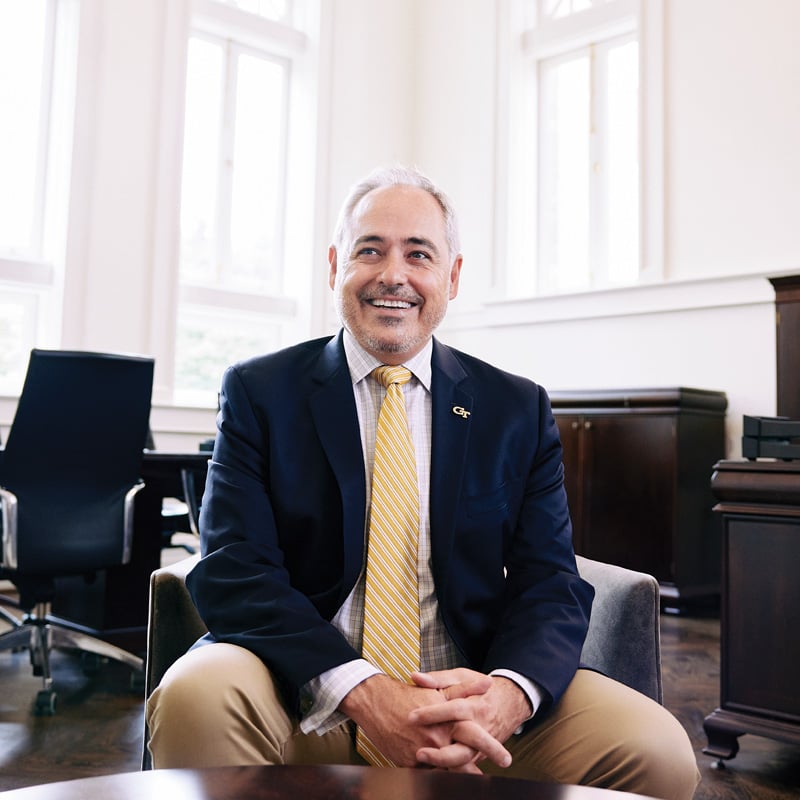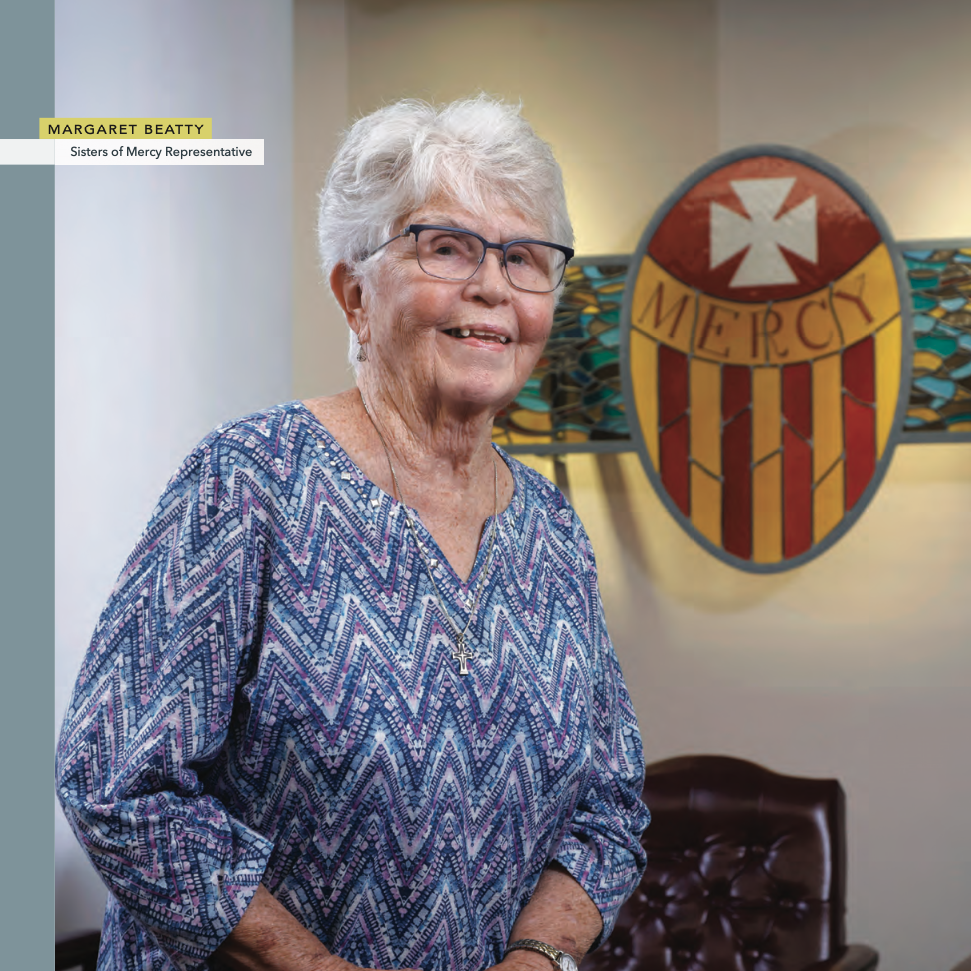Q&A with Ángel Cabrera
The Georgia Tech president talks about the institution’s growth and role beyond the classroom.

When Ángel Cabrera arrived in Atlanta in 2019 as Georgia Tech’s 12th president, it was something of a homecoming for him. He was a Fulbright Scholar at Tech in the 1990s, earning an M.S. and a Ph.D. in psychology and cognitive science.
Cabrera was born in Spain, the grandson of a teacher, and studied at the Universidad Politécnica in Madrid before coming to the U.S. He served most recently as president of George Mason University in Virginia, and before that led the Thunderbird School of Global Management, now part of Arizona State University.
Cabrera, 54, is a leader in advancing professional ethics, corporate social responsibility and expansion of products and services into international markets. He is on the board of the National Geographic Society and the Bankinter Innovation Foundation in Madrid and is a past board member of the Federal Reserve Bank of Richmond and a former advisor to the United Nations on academic affairs. Locally, he is a director of the Atlanta Committee for Progress and the Metro Atlanta Chamber.
From his commitment to diversity to his daily commutes via e-bike, Cabrera has brought a new level of energy to Tech, combined with a deep appreciation for the culture of his alma mater and a commitment to using technology to improve the human condition.
Cabrera talked to Georgia Trend’s Susan Percy about his vision for Georgia Tech and its 44,000 students. These are edited highlights of the interview.
GT: Is it gratifying to be back at your alma mater?
Cabrera: It’s been just a wonderful turn of events. I got my two graduate degrees here. My wife got two graduate degrees here. I found my wife at Georgia Tech. Then our son, years later, graduated from Georgia Tech. It was pretty amazing to be asked to lead an institution that has done so much for us.
GT: Do you see much difference in the students today compared to your own classmates?
Cabrera: There are many things that are totally recognizable. There is a sense of ingenuity, of We can do that. There’s a culture that hasn’t changed and a ton of traditions that are just so recognizable. Yet in other ways it’s a very different place. It’s a much more diverse place. Women have now reached 40% in our undergraduate population, an all-time high. We have many more students of color. Our students represent every state in the union, [nearly] every country around the world. That brings a great energy to the campus. It makes it an even richer experience.
GT: What about the academic caliber of the students?
Cabrera: We are competing for the best students in the country and in the world. Older alumni still remember when the provost would give them that [standard orientation warning], ‘Look to your left, look to your right; only one of you will graduate.’ Now I tell the students, ‘Look to your left, look to your right. The three of you will graduate.’ We have one of the best graduation rates in the country for a public university. The students we are attracting to Georgia Tech are just unbelievable. They are a lot smarter than we were back then.
GT: There was a time when Tech was regarded as a regional engineering school. Now it’s a top-tier research university with national prominence. What factors contributed to that?
Cabrera: We have had a sequence of great leaders. Wayne Clough and Bud Peterson provided steady and very effective leadership. They had a vision and pushed this institution higher. Our faculty have been incredible. They’ve competed for the best awards, the best students. This year we surpassed MIT in research and development expenditures. Success breeds more success. You get resources, you bring more talent. More talent brings more resources.
Technology has become the centerpiece of every aspect of society – the way we work, the way we live, the way we provide healthcare, the way we educate, the way we play. So the demand for technology leaders is unprecedented right now.
Georgia Tech made very visionary investments, beginning right after the Olympics, to transform our neighborhood into what you have seen Midtown become – one of the hottest innovation neighborhoods in America. Because we have talent, we have scale, we have built an attractive environment, all these big companies are flocking to our neighborhood. That has really put Georgia Tech among the best research universities in the country.
GT: Early in your tenure, you shepherded the creation of a new 10-year strategic plan. Why was it needed?
Cabrera: We had the luxury of being an institution that is growing and strong, going through a transfer of leadership. It was the right time for us to say, ‘OK, what’s next? Let’s articulate all of our shared aspirations for the future.’ I decided to make it a very inclusive process, so this is not just Cabrera’s plan. We had more than 5,000 interactions with individuals – faculty, students, employees, donors, alumni, community leaders. Out of this process came a new mission statement: We develop leaders who advance technology and improve the human condition. We don’t believe in technology for technology’s sake; we believe in technology as a tool to help us live better lives.
GT: What are some of the key components of the plan?
Cabrera: We’re totally devoted to having an impact on the way people live, in solving some of the biggest problems. That is the basis of the plan. We want to amplify – want to grow. We’ve been hesitant in the past about, is it OK to be big? Now we’re not hesitant. We are the biggest source of tech talent in the country. The world needs more of what we produce. We’re going to grow. We are growing our research. We are targeting our research to areas that are in dire need of new solutions. Another theme is to champion innovation, to continue the work we started in Technology Square and around us and be a source of not just smart technological talent but of innovators and startups. We want to expand access.
GT: Can you elaborate on the idea of access?
Cabrera: We want to be sure, as technology shapes our society, that everybody’s at the table. Everybody’s involved. We cannot accept the fact that right now there are very few women who get into computing, that many Black students [and] Hispanic students just do not choose to go into engineering or computing, [not] at the rates that other students do. If we’re going to produce technologies that help us live better lives, we need everybody at the table.
GT: Where do you see areas of growth for Tech in terms of research and teaching?
Cabrera: The whole area of artificial intelligence, machine learning, is shaping virtually every discipline. We have people in the College of Science doing physics and doing biology who are using artificial intelligence. We have industrial engineers and mechanical engineers who are using AI. Computer science, of course. The world of policy, public policy – artificial intelligence is shaping everything. That’s a core area in everything we do. It’s also an area for the liberal arts.
The whole biology area is hugely important – biotechnology and medical technology. Lastly, I’ll mention sustainability and climate change. That is one of biggest challenges we face. We need cleaner and better sources of energy. In general, how do we take care of our planet? How can we live good lives without ruining the planet we have?
GT: Would you talk a bit about Georgia Tech’s role beyond the campus, in the economic life of the state?
Cabrera: The biggest impact we are having in our city and our state is through economic development. We are by far the biggest contributor among our universities to the state economy. Data from the University of Georgia listed our economic impact [as] surpassing $4 billion. We collaborate with the Georgia Department of Economic Development, with the governor, with the city, attracting some of the biggest companies into our city and into our state – bringing Microsoft to Atlanta, bringing Cisco. Those companies – they’re very clear about why they’re coming to Atlanta. It’s all about talent. They want to be next to Georgia Tech. They want talent, want diversity, want quality of life, want the connectivity of a good airport.
GT: What about your involvement beyond Atlanta?
Cabrera: We try to make a difference throughout the state. One of our commitments is to make sure we grow that impact and tell that story better. We run the state’s incubator, the ATDC [Advanced Technology Development Center]. We just added startup coaches in Albany, Columbus, Macon. We have regional incubators in Alpharetta, Athens, Augusta. We have one of the biggest extension programs in the country – called EI2 – Enterprise Innovation Institute. We do everything we can to make a difference throughout the entire state.
GT: And Tech’s physical growth?
Cabrera: We’re now being much more intentional. It’s not just, ‘I need to grow Industrial Engineering, where do I put the building?’ It’s ‘how can we help the city with our own growth.’ Tech Square is a key example. By growing into Midtown, we initiated a process of economic development and innovation and startups that has transformed the city. We are going to start a similar project to Technology Square on the south side of the campus dedicated to biology. It’s going to be called Science Square.
GT: What concerns you for Tech’s future?
Cabrera: Because of our success in being one of top research universities in the nation, we have to compete to attract and to retain talent. We are competing with top universities. Figuring out a way to remain competitive is a big area of concern.
GT: What is helping?
Cabrera: A new budget that Gov. Kemp introduced and the General Assembly shaped is exceptionally generous for higher education. Our appropriation grew by almost $100 million [to more than $457 million]. That is helping us be more competitive.
GT: Anything that worries you for the future of higher education in general?
Cabrera: This whole notion of academic freedom and diversity of thought within universities is becoming more and more politically divisive, in a context where people find their own bubbles, and different ideas shall never meet. It is essential that we protect the character of our universities as places of diversity of ideas, where all the ideas have room, that we continue to work in guaranteeing the freedom of everybody to think, to express their views, to challenge their own thinking.
GT: The Board of Regents made a recent policy change regarding tenure – essentially providing a way to revoke it. Some higher education advocates have been critical of that move. What are your thoughts?
Cabrera: What the board did was make sure there are mechanisms to ensure that a tenured professor remains productive. Tenure is essential to the academic enterprise. Chancellor Sonny Perdue sent a letter to faculty making it clear that he believes in tenure, the board believes in tenure; we all believe tenure is essential because it is a guarantee. Tenure is given to faculty after they have proven they are leaders in their fields. It provides this important protection so they can ask uncomfortable questions and produce uncomfortable ideas at times without fear of any repercussion. That has not changed. What has changed is some of the mechanisms to make sure that once you’re tenured you continue to do your job.
GT: You must have lots of opportunities to participate in civic and educational endeavors beyond Tech. How do you go about determining where to devote your time?
Cabrera: The motto of Georgia Tech is Progress and Service, and that answers the question for me. Can I serve? Is there something unique that I or Georgia Tech can contribute to make a difference? The learning and progress piece is, ‘Will this experience help us grow, help me grow?’ A big part of my role as Georgia Tech president is to be scoping out the horizon, to look at where the world is going. I need to be out there.






